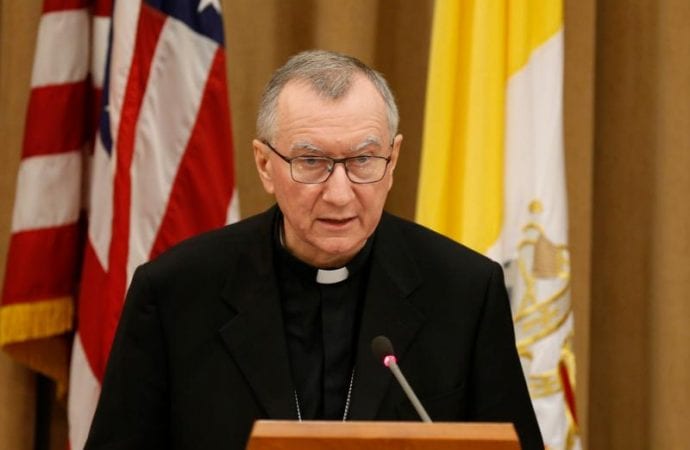Facing a steep uphill battle with an increasingly populist Europe, Vatican Secretary of State Cardinal Pietro Parolin on Wednesday backed comments from a fellow prelate insisting that the Holy See engage politicians with opposing political views, saying the approach must be one of dialogue.
Speaking to journalists May 29, Parolin noted that “The pope said - and he continues to say - dialogue, dialogue, dialogue” as the right approach to any discussion. And dialogue, he said, “is above all done with those who don’t think like us, those with whom we have some difficulty or problem.”
“I am of this opinion, so also with Salvini one must dialogue,” he said, referring to Italian deputy Prime Minister Matteo Salvini, who has sparred with the Vatican over his harsh anti-migration policies, and who has recently come under fire from Church officials for kissing the rosary and waving the Bible during political rallies.
Parolin’s comments back those made by German Cardinal Gerhard Müller, former head of the Vatican’s doctrine department, who in a May 28 interview with Italian newspaper Il Corriere della Sera said that in his view, the Church is not focusing enough on the faith, and “must not intrude in politics, when there is a democratically legitimized parliament and government as there is in Italy.”
“It’s better to talk with Salvini, discuss, or correct him when necessary,” he added.
Parolin, who recently chided Salvini for his use of religious symbols during political events, insisted that “to use religious symbols for party rallies is a risk of abusing these symbols” and that “we can’t be indifferent to this reality,” but he also said the door must always be kept open to respectful engagement.
He also spoke of the recent May 20-26 elections for the European Parliament, which despite an overall victory for moderates at the EU level, saw an uptick in support for populist candidates in traditionally Catholic countries such as Poland, Hungary and France.
Though the outcome of the elections must be accepted, “I think we need to look forward in the sense of continuing to dialogue and continue building the Europe that we want,” Parolin said, indicating that the Vatican will not back down on key issues such as immigration.
Calling the nationalist tendency to “withdraw on oneself” a strong movement which “puts into question the European project,” he said the cultural status must be accepted for what it is, but it must be with a “positive and encouraging vision” that says, “this is reality, but we can still build.”
Parolin spoke at the May 29 award ceremony for the “Economy and Society” prize from the pontifical foundation, Centesimus Annus, created by St. John Paul II in 1991 with the publication of his encyclical by the same title that year.
The award is given every two years to individuals seen as making a significant contribution to implementing the social doctrine of the Catholic Church.
Presented by Parolin and German Cardinal Reinhard Marx, the Coordinator of the Vatican’s Council for Economic Affairs and chairman of the jury for prize selection, this year’s award was given to Professor Mary L. Hirschfeld, a convert to Catholicism and an associate professor of economics and theology in the Department of Humanities at Villanova University, for her recent book, Aquinas and the Market: Toward a Humane Economy.
In her remarks, Hirschfeld said the economy must be built on basic human values and directed at human dignity, and explored different interpretations of happiness, from Aristotle, to Aquinas and to secular society as a whole, which tends to focus on money, relating happiness with prosperity.
“We cannot think well about economic life, of the challenges to economic justice and the environment if we do not first think hard about the shape of human happiness and the proper role of wealth,” she said, insisting that the Catholic Church in particular “has much wisdom to share with the world through the body of her social thought.”
In his speech, Marx said Hirschfeld’s book serves as an invitation for economists to “embed their analysis in a holistic account of happiness.”
“I think that the lecture of this book can help us who are living in a society where money seems to govern all things to pose certain questions about the sense of our life and our own relationship with the goods of this world,” he said, adding that to find the answer to these questions “is one of the conditions for a truly human life.”
Parolin closed the event, saying the topic of Hirschfeld’s book “is of great importance for the social doctrine of the Church,” and for the flourishing of human life.
The book, he said, “succeeded in offering a consistent model of economic-theology dialogue, which opens up a broad scientific panorama.”
“I am sure that the author is aware that her book is part of a rich cultural tradition and that it will serve to renew and strengthen the debate on today’s world economic and political structure with solid philosophical and theological elements,” he said, thanking Hirschfeld for her work.

